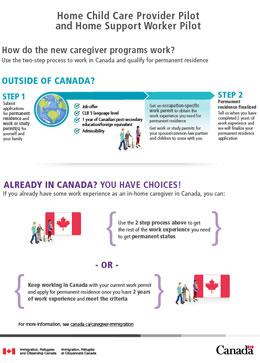“Canada is caring for our caregivers”

Showing its caring for Canada’s caregivers, Ottawa has launched 2 new pilots that will help caregivers who come to this country make it their permanent home.
Caregivers will now only receive a work permit if they have a job offer in Canada and meet standard criteria for economic immigration programs. Once working in Canada, caregivers will be able to begin gaining the required 2 years of Canadian work experience to apply for permanent residence.
The new Home Child Care Provider and Home Support Worker pilots will open for applications on June 18, 2019, replacing the expiring Caring for Children and Caring for People with High Medical Needs pilots.
Most of Canada’s foreign caregivers come from the Philippines and South Asia.
Through these new pilots, caregivers will also benefit from:
occupation-specific work permits, rather than employer-specific, to allow for a fast change of employers when necessary;
open work permits and/or study permits for the caregivers’ immediate family, to help families come to Canada together; and
a clear transition from temporary to permanent status, to ensure that once caregivers have met the work experience requirement, they will be able to become permanent residents quickly.
These new pilots provide caregivers from abroad and their families with a clear, direct pathway to permanent residence.
“Canada is caring for our caregivers. We made a commitment to improve the lives of caregivers and their families who come from around the world to care for our loved ones and with these new pilots, we are doing exactly that,” said Ahmed Hussen, Minister of Immigration, Refugees and Citizenship
According to Stats Canada, approximately 6 million Canadians are over 65 and the number of Canadians receiving some type of home healthcare sits at around 8 percent of the country’s total population. The estimated number of seniors requiring health care services is expected to double over the next 20 years, according to the Canadian Institute for Health.
The Canada-based Caregivers' Action Center (CAC) and other migrant workers' groups have tempered enthusiasm about the new programs, and have launched an online campaign reiterating their call for the federal government to offer care workers landed status upon arrival, a media report in the Philippines said.
They said that the new program requirements will "shut out" migrants with fewer resources who cannot comply with the high English language proficiency and the Canadian one-year post-secondary education equivalent.
The campaign also asked for an end to the backlog of 30,000 care workers waiting for a decision on their permanent residency, and 20,000 for family reunification.
The CAC and other migrant workers' groups have launched an email campaign reiterating their call for the federal government to offer care workers landed status upon arrival.
"It's only fair for us to have landed status upon arrival. We're not asking for special treatment – just the same rights to be with our families and even for our work to be recognized," said Kara Manso, who came to Canada as a caregiver in 2012 and now heads CAC.
Manso said. "We've contributed. We're part of Canadian society and we should be treated fairly."
The email, addressed to the immigration minister, also asks that undocumented care workers and those who have not finished 12 months of service be allowed to apply for permanent residence via the interim pathway.
"The new 2019 pilot program must not repeat the mistakes of the past. This means open work permits, no second medical, no high school English language test, and no requirement for one-year Canadian post-secondary education," the email stated.
http://www.asianpacificpost.com/media/graphics/caregiver-application-pro...
Quick facts
• The expiring pilots will close to new applications on June 18, 2019. Caregivers who have applied before this date will continue to have their applications processed through to a final decision.
• Caregivers who have been working toward applying to the soon-to-be-expired pilots can now apply through either the Home Child Care Provider Pilot or the Home Support Worker Pilot.
• The Interim Pathway for Caregivers, the short-term pathway for caregivers who came to Canada as temporary foreign workers since 2014 but were unable to qualify for permanent residence through an existing program, will be extended. It will re-open on July 8, 2019 and accept applications for 3 months.
• The new pilots, Home Child Care Provider and Home Support Worker, will each have a maximum of 2,750 principal applicants, for a total of 5,500 principal applicants per year, plus their immediate family.
• Initial applications to the new pilots will have a 12-month processing service standard. A 6-month processing standard will apply for finalizing an application after the caregiver submits proof that they have met the work experience requirement.
• With the move to occupation-specific work permits under the Home Child Care and Home Support Worker pilots, employers will no longer need a Labour Market Impact Assessment before hiring a caregiver from overseas.
By the numbers
More than 8 million Canadians provided informal care to family member or friend.
More than 1 million caregivers are older than 65.
44% of caregivers between the ages of 45-64 care for both a parent and children.
The number of seniors requiring care is set to double over the next 15 years.
39% of caregivers look after the needs of their parents, 8% care for a spouse.
35% of Canada’s workforce provides informal, unpaid work while working.
1.6 million caregivers took time off work to provide care.
One-in-ten caregivers spend more than 30 hours per week providing care.
80% of all care given to seniors in the community and 30% of services to seniors in institutions are provided by informal caregivers.
The economic value of caregivers is astounding: caregivers who look after seniors save Canada’s health care system between $24 to 31 billion annually. CARP (Canadian Association for Retired Persons)






